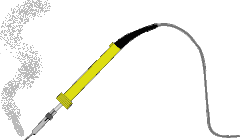So, having given up on the VFO, this week I built a VXO. The IF in my W4OP-built Barbones Superhet is at 5 MHz. That receiver has a VXO running at 23.133-23.168 MHz with two crystals switchable from the front panel. My plan is to build a 5 MHz filter for the BITX 17. So I just plucked one of the crystals in the Barebones RX and used it to test and tweak the VXO. Trying different values for the series inductor, I got wide variations in freq swing. With .7uH I could only pull the rock 9 kHz (too little). With 5.6 uH, it was pulling 434 KHz (way too much -- it was acting like a VFO). 3.213 uH was just right: With my 19-148 pF variable cap (with 53pF in series) I got a swing of 22 kHz, with crystal-oscillator stability.
I know, I know: I could have done this with a DDS chip, or with an SI570. But simplicity is a virtue, and the BITX is all about simplicity, right? Having recently built a DDS RF generator, and now this simple three transistor device, I must say that I like the simple analog circuit better. But hey, that's just me. I'll talk about this in the next podcast.
Today I built the mic amp circuit. You can see it off to the right of the VXO.
One of these days I'm going to have to actually troubleshoot and fix my Tek 465. But I'm
afraid of that thing! The voltages in there are HIGH, and so is the circuit complexity.
Our book: "SolderSmoke -- Global Adventures in Wireless Electronics"
http://soldersmoke.com/book.htm
Our coffee mugs, T-Shirts, bumper stickers:
http://www.cafepress.com/SolderSmoke
Our Book Store:
http://astore.amazon.com/contracross-20















































